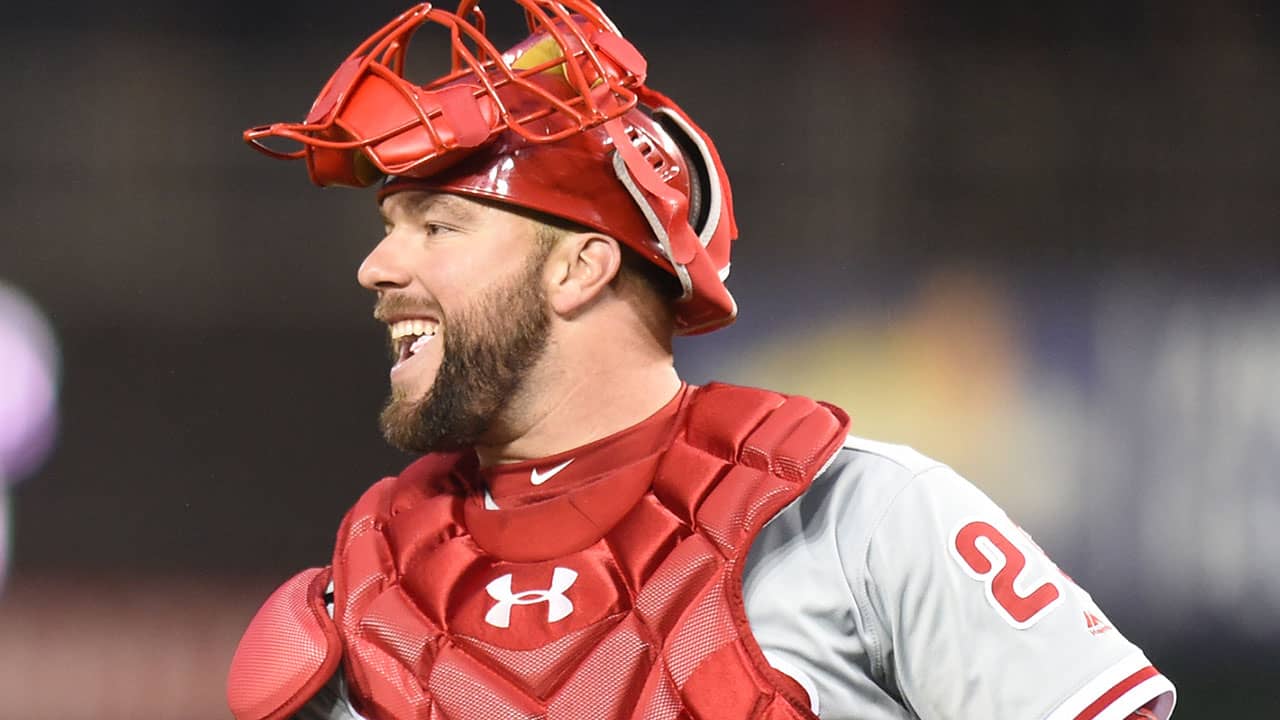

Here is No. 3.
Here’s what it takes to make that play.
It takes David Hernandez to throw a slider high and over the plate to Jordan Pacheco.
Hernandez started the season on a poor note but righted himself quickly, coming into the May 14 game against Cincinnati with a 2.76 ERA. This was good news for him, for the Phillies, and for anyone who believes in second chances.
After injuring his elbow and undergoing Tommy John surgery in 2014, Hernandez resurfaced in Arizona in 2015 and performed well enough to earn a two-year deal with the Phillies. There was reason to be skeptical, but the Phillies knew they were taking a suitable gamble on a once-promising reliever trying to reclaim his career. One month into the 2016 season, Hernandez was doing just that, striking out 24 in 16 innings.
But Hernandez was scuffling in this ninth inning. In fact, he wasn’t supposed to be there.
So it takes Jeanmar Gomez to be unavailable.
Gomez, the new closer for the Phillies, had pitched in the previous two games, both wins. Though he only threw a total of 17 pitches between those games, Gomez had to watch as Hernandez walked Jay Bruce, and surrendered a single to Eugenio Suarez and a double to Adam Duvall. He had to watch as the Reds cut the deficit from 4-2 to 4-3, and so now the Herrera home run had proven necessary.
So it takes Odubel Herrera to lift the ball barely above the fence, even despite a greedy fan.
You see, this fan tried to grab the ball as it lined toward the right field seats. This fan seemed to bolt over three chairs to get in position, put his hands out there and ensured the ball would at least strike his palms. It did, then bounced back onto the field.
What if the interference was enough to overturn the home run call? What if Herrera had to return to the base paths, over to second base, and watch as two groundouts erased the Phils’ threat against J.C. Ramirez? Luckily we would never know. The fan’s interference wasn’t enough. The home run stood. The Phils had an insurance run they would desperately need.
Because in the ninth, with two men on, a run across, one out and the Reds down one, Hernandez threw the high slider, Pacheco struck it and lifted the ball to left field, possibly enough to score Suarez from third.
It also takes a fly ball. A line drive doesn’t give Tyler Goeddel enough time to see the ball, position himself, ready his stance and fire. So give Hernandez credit for throwing the high pitch, and hey, Pacheco swung at it.
But what about Goeddel? It takes a lot of perfection from him.
He watched the ball sail toward him, readied his feet and settled. As he caught the ball above eye level, his right hand was already moving to transfer the ball, and his front foot was in the air, ready to plant.
Then the catch. He whipped to a throwing position, planted the front foot to his side, transferred the ball at chest level and, after planting, uncorked a running bullet that sent him tumbling for just a moment.
The throw was outstanding, a perfect low arc that had no other place to go but Cameron Rupp’s awaiting mitt.
And what about Rupp?
He aligned himself with clear focus on Goeddel, his left leg at the corner of the plate, his crouch over the plate but just in front, in good position to make the quick tag to the left. Suarez would have to bring his arm either around or through Rupp’s crouch, but Rupp gave him enough of a path to the plate considering the situation. And the situation was the perfect throw.
The throw drew Rupp slightly to the left, toward the line and right into Suarez. In fact, the ball came direly close to nailing Suarez in the arm, but Rupp cajoled it just before impact.
Then, the impact.
At the moment Rupp caught the ball, Suarez shouldered into him, knocking him off onto his back. The two men tumbled, with Rupp falling across the plate and onto his stomach, and Suarez landing in a seated position, his foot on the plate in case Rupp couldn’t hang onto the ball.
Surely impact could’ve popped the ball out of Rupp’s clutch, but as Rupp rolled to his stomach, he removed the ball from his mitt and held onto it like a baby, showing it to the umpire, to the fans, to the Reds and to the entire Delaware Valley.
Suarez was out. The Reds were out. The Phillies had won.
It takes a lot for the perfect play to occur, the one that ends a game in the most thrilling of ways, the one that sends fans to hysterics and the Phillies to a season-best seven games over .500.
That may have been the high point of the year, and what a high point – when everything comes together, almost harmonically, the way baseball can sometimes do.